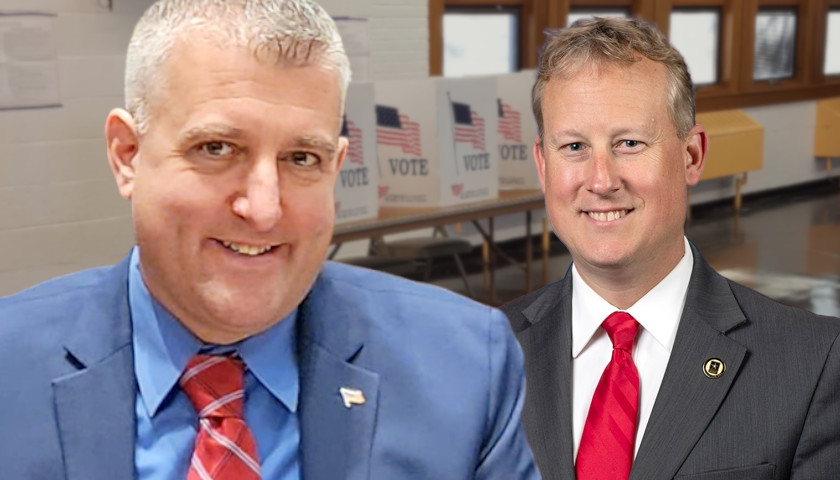Pennsylvania State Senators Ryan Aument (R-Lititz) (pictured above, right) and Frank Farry (R-Langhorne) (pictured above, left) on Wednesday proposed creating runoff primary elections in the Keystone State.
The two lawmakers wrote in a memorandum describing their legislation to ensure that all major-party nominees have the support of at least half of the participants in a primary. Their bill would require a second primary contest between the top two vote-getters in the initial nomination election whenever no candidate received more than 50 percent of the vote. Aument and Farry clarified that their bill would not apply to general elections.
“In recent years we have seen a number of primary elections that attract a large number of candidates,” they wrote. “In large, competitive primaries, a candidate can win with the support of only a small fraction of voters. This leads to voters feeling dissatisfied and unrepresented in general elections, especially in areas where there is one-party dominance, and the winner of the dominant party primary election is almost always the winner of the general election.”
Just one day earlier, U.S. Representative Brendan Boyle (D-PA-2) voiced similar dissatisfaction with the current system, noting the eventual winner of the Democratic Philadelphia mayoral primary, who would almost certainly become mayor, would receive a modest plurality of votes. Indeed, Democratic nominee Cherelle Parker ended up getting only 32.7 percent of the 237,143 votes cast, though that percentage was slightly bigger than Boyle worried it could have been.
“Our current election system made sense when both parties were competitive citywide, which was the case for the post-WWII period up through 2003,” the congressman tweeted. “Since then, however, it’s clear that the winner of the Democratic Primary will be the de facto next mayor. It’s nuts that our next mayor could be someone who receives 25% (or less!) in the Democratic Primary.”
Boyle added he meant no disrespect to whoever would emerge as his party’s nominee but insisted that a runoff system or a ranked-choice-voting process would achieve more democratic outcomes in primaries. (Ranked-choice voting, supported by many government-reform organizations like the Forward Party, calls upon voters to rank their top choices in order of preference. Instant runoffs occur as part of the counting process when no candidate initially breaks 50 percent.)
Alabama, Arkansas, Georgia, Mississippi, North Carolina, Oklahoma, South Carolina, South Dakota, Texas, and Vermont all hold primary runoff elections in at least some circumstances. In South Dakota’s case, these only occur for congressional and gubernatorial elections. Vermont conducts runoffs only in cases of tie votes.
Ryan Shafik, principal of the campaign-consulting firm Rockwood Strategies, opined that runoffs unnecessarily distract politicians from dealing with important matters facing their constituents.
“It contributes to the endless media frenzy and endless election cycle we live in and therefore takes the focus off of governing, which is why you run for election,” he told The Pennsylvania Daily Star.
– – –
Bradley Vasoli is managing editor of The Pennsylvania Daily Star. Follow Brad on Twitter at @BVasoli. Email tips to [email protected].
Photo “Frank Farry” by Frank Farry. Background Photo “Voting Booths” by Tim Evanson. CC BY-SA 2.0.








